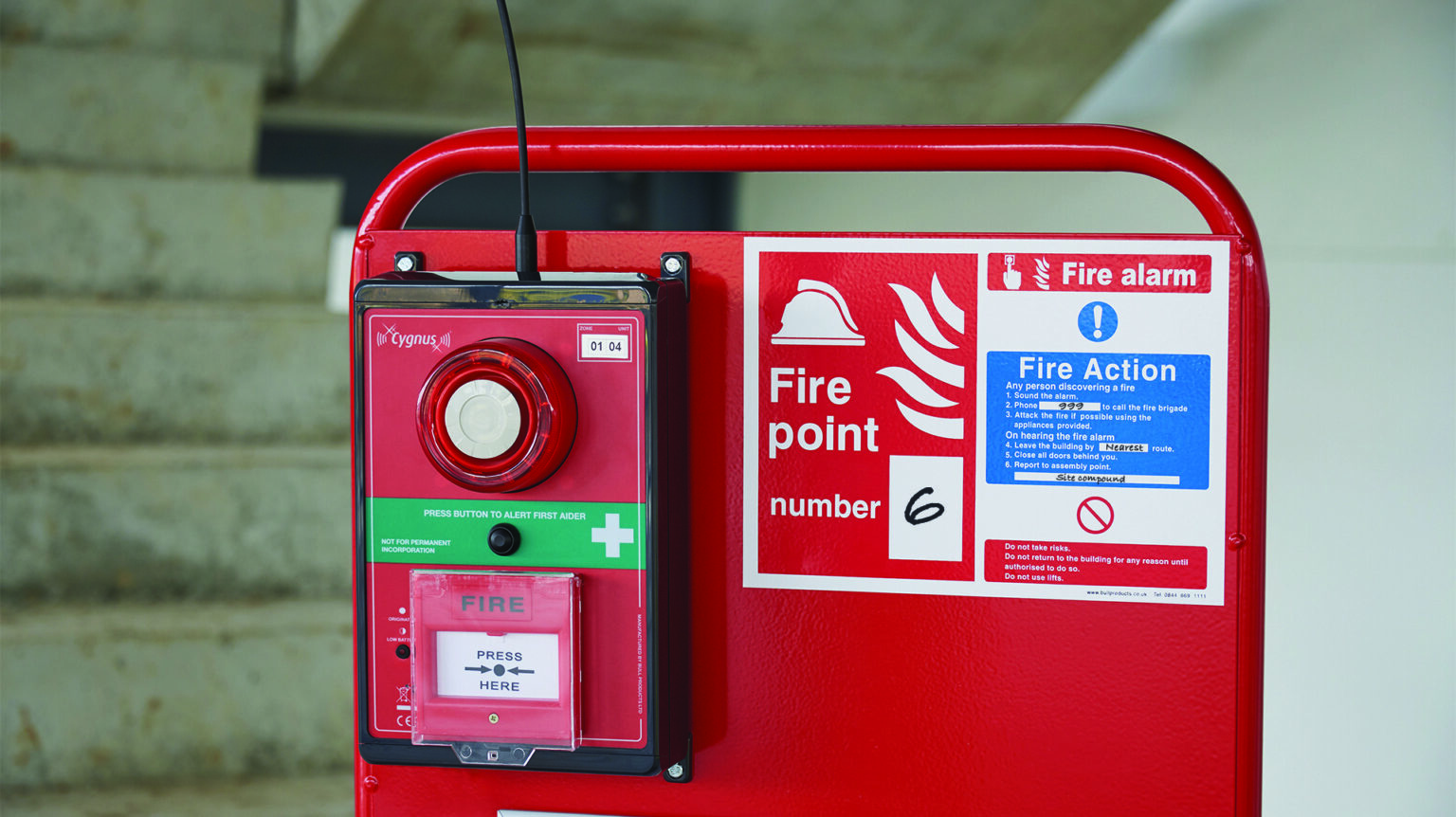Exclusive: Fire Safety on Temporary Sites: Minimising Risk
- October 19, 2021
- 9:29 am


Iain Hoey
Share this content
Ross Markham, Managing Director of Bull Products Limited discusses how fire safety on temporary sites can be improved
Fire safety in permanent structures and buildings, like homes and offices has been high in the news agenda over recent years, but fires are all too common when the site is temporary in nature. The most common type of temporary site is a construction site, whether that is a new build or a refurbishment project. The fire at the Notre-Dame cathedral renovation is a prime example of the potential risks within a construction site.
However, there are other temporary sites where fire presents a risk to assets and human life. These could include shipbuilding sites, civil engineering and infrastructure projects and even Covid test centres and festivals.
What are the risks?
There are numerous causes of fires on temporary installations. These include ignition risks, electrical faults, flammable materials and unauthorised site access. Below are the dangers that each bring to temporary sites.
Ignition Risk
Historically, smoking on sites has been a major cause of fire on building sites, normally when cigarettes are not properly extinguished. Most sites now prohibit smoking on site; however this has to be constantly and consistently enforced. Having good signage across the sites acts as a good continuous reminder. Designated smoking areas should also be established well away from the main work areas and offices.
Heat is used in many industrial applications, such as when welding and soldering metals. Naked flames are often used in the application of roofing materials. During these processes, sparks can also be a cause of fires.
It is important that site workers are well trained to know the potential site of hazards, so they can minimise the risk by following the correct procedures in the workplace, such as storing materials in the correct place and keeping the workplace clean and tidy.
Many larger sites will have a permit to work scheme (PTW) whereby employees are inducted and trained on health and safety issues, including fire prevention. If a fire breaks out, good training is paramount. Workers should also have access to the correct firefighting equipment and the site should be adequately alarmed, with clear and obvious alarm points and the correct type of detection (heat, smoke etc).
Electrical Faults
Old wiring systems are often the cause of fire in older buildings. For example, when refurbishment projects begin, old wiring circuits can be disturbed and create a heightened risk of fire. Tangled and damaged wires can also overheat and cause fires.
Old halogen and halide light can get very hot and should be avoided on construction sites. One way to overcome this is through the use LEDs, which operate at a low temperature, presenting a fraction of the risk. They also keep energy usage and cost down. All lighting and heating should be kept away from combustible materials – that is to say, it is paramount to ensure that sites are kept clean, tidy and organised.
To minimise the risk of fire caused by electrical appliances, machinery and equipment on temporary sites, PAT testing should be undertaken. All electrical installations must also comply with BS7671:2008. This standard includes a section specific to construction sites.
Flammable Materials
Many temporary sites contain flammable substances in the form of solids (explosives), liquids (i.e. petrol and diesel) and gases (propane, butane). Poorly stored or managed flammables can cause catastrophic fires and even explosions. Additionally, combustible materials like waste packaging and paper, stored incorrectly, can heighten the risk of fire. General waste should also be stored well away from ignition risks.
The management and control of building materials and waste on site is regulated by the Environment Agency through the Site Waste Management Plans Regulations, 2008.
Having adequate spill control facilities and training is useful if flammable accelerants like petroleum, diesel or paraffin are spilt on-site.
Unauthorised Site Access
Thankfully arson is rare on temporary sites, but when it happens it can be catastrophic. Controlling access through adequate physical perimeter security along with gated access points with full identification checks should be a high priority. CCTV systems and security guards may also be an option for larger sites. Again, keeping flammable substances and accelerants locked away will reduce the temptation and opportunity for intruders.
Access management software, like the SmartGate system, can also pre-register visitors, induct them on health and safety, issue permits to work and ensure contractors have adequate certifications and accreditations.
How can temporary site operators and contractors minimise risk?
At Bull, we have developed the Fire360 process which is a sequence of robust events to ensure a low-risk environment.
Some of the key features of the Fire360 process include:
- Initial site survey to establish the fire safety requirements of the site, both to maximise protection but also to comply with fire safety regulation.
- Carry out an initial formal Fire Risk Assessment (FRA) by a qualified fire risk assessor followed by subsequent FRA’s at regular intervals, normally every 3 or 6 months.
- Installation of a fire protection systems, such as the Cygnus 1 system, by BAFE and CSCS certified engineers
- Ensure your on-site team receives professional fire safety training, with specialist training for fire marshals and first-aiders.
- When a site is completed, fire safety equipment should be professionally de-commissioned. Bull offers a service to collect and store equipment, so it can be tested, cleaned and delivered to the site where it is required next.
Even if all the preventive measures are undertaken, fire can still break out. If that happens, it is important to have a robust alarm system developed specifically for temporary sites, such as the Cygnus 1 system. This system is completely wireless, making installation simple and quick. Cygnus 1 has an extremely strong radio signal, which means it has a greater range and can reach shielded areas of the building that other detection systems cannot. Once installed, Cygnus 1 creates a wireless mesh, or network, with each detector and the control panel. Should a detector be damaged or be obstructed, the Cygnus 1 mesh will self-heal, ensuring coverage throughout the site.
To sum up, by being proactive, systematic and organised, the risk of damaging fires on temporary sites can be dramatically reduced. Whether a site is temporary or permanent, there is no need to compromise on fire safety.
CASE STUDY
PREMIER MODULAR – COVID-19 test sites across the UK protected with Bull Products
Earlier this year, Bull Products was selected to supply its Cygnus Wireless Alarm System to around 50 Covid-19 standalone test sites across the UK.
Premier Modular is the modular building specialist responsible for installing 50 self-contained Covid test sites across the UK, from Inverness to Portsmouth as part of the national effort to support the NHS in increasing testing capacity.
Within six hours of the initial order, Bull installed its Fire Call Point Alarms and Smoke Detectors to the first test site delivered by Premier which was located in Bolton.
Matthew Trigwell, Sales Director at Bull Products, says: “It’s a privilege to work alongside Premier Modular to provide fire safety equipment to these vital test sites. The Cygnus alarm system provides an ideal solution to projects that require a quick turnaround thanks to the speed of installation and ease of use of this temporary fire detection and alarm system.
“It’s another example of how the Cygnus wireless system is ideal for all temporary sites to protect both people and property.”
Elgan Roberts, Contracts Manager at Premier Modular, adds: “We have worked with Bull for many years, and so we were confident they were the perfect partner to supply the Cygnus alarm system. The wireless alarm system is reliable and flexible, and we have no doubt it will provide enhanced fire safety across all of the Covid-19 test sites that we are installing around the UK.”




